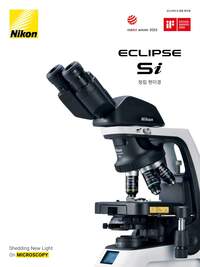- ko Change Region
- Global Site
ECLIPSE Si
Upright Microscope
편안함 속에서 포커스하세요. 편안함에 포커스를 맞췄습니다.
니콘은 수많은 시간을 현미경을 사용하며 보내는 전문가의 엄격한 요구 사항을 충족하도록 ECLIPSE Si를 설계했습니다. ECLIPSE Si는 작동 효율성을 향상하기 위해 인체공학적으로 설계되었습니다. 이 강력한 도구는 신체의 부담을 감소시켜 더 오래 집중할 수 있도록 도와줍니다. ECLIPSE Si는 미시세계 탐험 가능성을 확장하는 현미경의 새로운 표준입니다.
주요 특징들
효율적인 워크플로 추구
ECLIPSE Si는 현미경 사용 중 피로 감소를 주요 목표로 개발되었습니다. ECLIPSE Si는 불필요한 조절을 제거하고 효율적이고 편안한 작동이 가능합니다. 인체공학적인 설계로, 반복적인 작업 수행 시에도 자연스러운 자세가 가능합니다.
배율 전환 시 편안한 밝기 유지
배율이 다른 대물렌즈는 빛을 다양한 각도로 투과시킵니다. 따라서, 사용자는 대물렌즈를 변경할 때마다 광도를 조절해야 합니다. 또한 고배율 대물렌즈에서 저배율 대물렌즈로 전환할 경우, 급격한 밝기 증가로 인해 눈의 피로를 유발하는 경우가 많습니다. ECLIPSE Si는 각 대물렌즈에 대한 광도 수준을 자동으로 기억하고 설정하는 지능형 광도 관리(LIM) 기능을 갖추고 있습니다. LIM 기능은 광도 조정에 소요되는 시간을 최대 40%까지 감소시킵니다*. ECLIPSE Si를 사용하면, 배율 변경이 자주 필요한 루틴의 경우에도 사용자는 편안함을 높이고 시간을 절약할 수 있습니다.
* 이전 LED 모델 대비 대물렌즈 3개를 변경하고 광도를 조정하는데 소요되는 시간(니콘이 테스트 실행)
LIM 기능을 활성화하려면 밝기 조절 노브를 짧게 누르십시오.
LIM 기능 OFF
밝기는 대물렌즈에 따라 달라지므로, 배율을 전환하면 눈의 피로를 유발할 수 있습니다
고출력 대물렌즈 사용
저출력 대물렌즈 사용
LIM 기능 ON
최적의 광도 수준이 자동으로 호출되어 각 대물렌즈에 적용되므로, 배율을 변경하고 워크플로를 간소화하는 경우, 예상하지 못한 광도 변화를 제거합니다.
고출력 대물렌즈 사용
저출력 대물렌즈 사용
수월한 슬라이드 교체를 위한 낮은 스테이지
ECLIPSE Si 스테이지의 높이는 기존 현미경보다 약 50mm 낮은 135mm입니다. 하부 스테이지 디자인은 표본 슬라이드를 교체하는 데 필요한 동작 범위를 줄여 팔과 어깨의 피로를 감소합니다. 스테이지 이동 노브의 위치도 더 낮기 때문에, 테이블에 손을 얹은 상태에서 표본 슬라이드의 다른 영역을 쉽게 탐색할 수 있습니다. 표본 홀더를 열고 닫는 레버도 작동하기 쉬운 크기의 모양으로 인체공학적으로 설계되었습니다. 또한, ECLIPSE Si는 슬라이드 교체를 최적화하기 위해 기존 현미경에 비해 스테이지가 30% 더 작습니다.
| 기존 현미경 | ECLIPSE Si |
작동하기 쉬운 표본 홀더
현미경 워크플로 전체에 걸쳐 자연스러운 자세를 유지
아이피스의 기울기 각도는 45도로, 자연스러운 자세를 유지한 채로 아이피스를 통해 관찰할 수 있습니다. 또한 낮은 스테이지 디자인으로 자세를 조정할 필요 없이 아이피스를 통해 보는 자세에서 스테이지 위의 슬라이드 위치를 확인하는 동작으로 원활하게 전환할 수 있습니다. 아이피스의 높이를 추가로 맞춤 조정할 수 있는 아이레벨 라이저도 옵션으로 있습니다.
아이레벨 라이저
관찰자세를 유지한 채로 스테이지 점검
수직 멈춤 장치 덕분에 걱정 없는 포커싱
ECLIPSE Si에는 스테이지 높이의 상한 설정에 사용할 수 있는 스토퍼가 장착되어 있습니다. 포커스 노브를 돌려도 스테이지가 설정된 높이에서 정지하므로, 과도한 포커스로 인해 슬라이드가 깨지거나 대물렌즈가 손상될 위험이 없습니다. 스테이지 높이에 대한 걱정 없이, 안심하고 표본 교환 및 포커싱을 수행할 수 있습니다.
스테이지는 설정된 높이 위로 올라가지 않습니다.
설정하고 싶은 높이에서 나사를 돌리기만 하면 되는 간편한 작동
스트레스 없는 사용 편의성 추구
빈번한 표본 교체로 인한 피로를 없애고 보다 편안한 사용자 경험을 제공하는 현미경을 디자인하고 싶었습니다. ECLIPSE Si는 불필요한 신체 움직임을 최소화하기 위해 혁신적인 기능과 지능적인 디자인을 결합하여, 많은 수의 슬라이드를 검사할 때에도 시간을 절약하고 사용자의 부담을 줄입니다.
한 손으로 포커스 조절과 스테이지 이동
조동 및 미동 포커스 노브는 현미경의 양쪽에 있어 어느 손으로도 포커스를 맞출 수 있습니다. 또한, 스테이지 핸들이 포커스 노브 가까이에 있어, 사용자는 한 손으로 스테이지 위치와 초점을 쉽게 조정할 수 있습니다. 같은 손으로 스테이지 이동 및 포커스를 제어할 수 있으므로, 다른 손은 노즈피스를 회전하거나 슬라이드를 교체하는 데 사용할 수 있습니다. 이 기능은 많은 표본 슬라이드를 검사할 경우에도 효율적인 워크플로를 제공합니다.
| 조동 포커스 노브 | 미동 포커스 노브 |
조동/미동 포커스 및 스테이지 이동을 한 손으로 조작할 수 있습니다
상태 디스플레이
조명 밝기는 LCD의 막대 그래프로 표시됩니다. 관찰 자세를 유지하면서 배율을 한눈에 확인할 수 있습니다.
❶ECO 모드: ON ❷LIM 기능: ON ❸밝기 상태 ❹개체 이름 ❺배율
노브 회전 방향 표시
포커스 및 밝기 조절 노브의 회전 방향을 직관적으로 파악할 수 있습니다.
작동할 노브를 망설임 없이 선택
조작할 스테이지 이동 노브의 아이콘이 표본의 이동 눈금에 전후좌우 방향으로 그림으로 표시됩니다.
편안한 배율 변경
역방향형 노즈피스는 사용 중인 대물렌즈에 쉽게 접근하고 볼 수 있도록 합니다. 배율 변경이 자주 필요한 경우, 팔의 부담을 줄이기 위해 노즈피스의 위치가 낮습니다. 노즈피스는 스무스한 회전을 위해 쉽게 잡을 수 있으며, 최대 5개의 대물렌즈를 수용하여 다양한 배율을 제공합니다.
회전이 쉬운 5중 노즈피스
LED 조명의 푸른색 성분 차단
LED 조명은 푸른색 또는 단파장의 빛을 다량 포함하고 있기 때문에, 장시간 관찰은 눈에 피로를 줄 수 있다는 우려가 있습니다. ECLIPSE Si는 LED 조명의 푸른색 성분을 제거하기 위해 필드 렌즈에 배치할 수 있는 옵션형 청색광 차단 필터를 제공합니다.
일정 시간 동안 사용하지 않으면 자동으로 꺼짐
ECLIPSE Si에는 일정 시간 동안 사용하지 않으면 조명이 자동으로 꺼지는 ECO 모드가 있습니다. 비사용 시간의 길이는 조정 가능합니다. ECO 모드로 ECLIPSE Si를 사용하면 수월하게 전력을 절약할 수 있습니다.
밝기 조절 노브를 길게 눌러 ECO 모드를 켭니다
고품질 이미지를 위한 우수한 광학
현미경 제조업체로서의 오랜 전통으로부터 절정에 도달한 니콘의 고급 광학 기술은 ECLIPSE Si에서 중요한 역할을 합니다. 표본의 정확한 관찰을 위한 필요 조건을 충족하는 능력은 우리에게 자부심의 원천입니다.
뛰어난 이미지 평탄도 및 색수차 보정
ECLIPSE Si는 CFI E Plan 시리즈 대물렌즈를 사용하여 시야 주변까지 평평하고 선명한 이미지를 제공합니다. 이 대물렌즈는 CFI60 무한 보정 광학계의 일부로, 고해상도와 긴 작동거리를 모두 제공합니다. 다양한 니콘 CFI60 대물렌즈를 사용할 수 있습니다.
CFI E plan Achromat 시리즈 대물렌즈
22mm의 FOV로 관찰
ECLIPSE Si는 FOV22 튜브*와 22mm의 대형 FOV를 지원하는 렌즈를 장착할 경우, 임상 관찰의 효율을 높일 수 있습니다.
* C-TB, C-TF, C-TT 및 C-TE2 튜브
색온도가 일정한 장수명 LED
고휘도 백색 LED 광원은 최대 60,000시간의 긴 수명이 특징입니다. 밝기를 바꿔도 색온도가 일정하게 유지되기 때문에, 배율을 바꿔도 이미지의 색상이 변하지 않습니다.
FOV 주변부까지 균일한 밝기
조명 시스템에는 FOV 전체에 균일한 밝기를 제공하는 플라이아이 렌즈가 내장되어 있습니다.
플라이아이 렌즈
FOV 외부의 빛 차단
ECLIPSE Si에는 최적의 관찰 및 이미지 획득을 위해 조명 범위를 제한하는데 사용할 수 있는 필드 다이어프램이 장착되어 있습니다. 필드 다이어프램을 조정하면 플레어 및 고스트 현상 발생이 억제되어, 고대비 이미지 관찰이 가능합니다. 형광 관찰 중에 표본의 광표백 범위도 제한할 수 있습니다.
조명 범위가 FOV에 포함될 때까지 필드 다이어프램 다이얼을 돌립니다.
명시야 관찰
이미지 평탄도가 우수하고 색수차 보정이 뛰어난 대물렌즈를 사용하여, FOV 전체에 밝고 균일한 조명으로 고품질 이미지를 획득할 수 있습니다.
위상차 관찰
위상차 콘덴서와 위상차 대물렌즈를 결합하면 무색 투명한 표본을 염료로 염색하거나 라벨링하지 않고 고대비로 관찰할 수 있습니다. 위상차 슬라이더가 삽입된 표준 Abbe 콘덴서를 사용하면 위상차 관찰도 가능합니다.
Hardware required for phase contrast observation:
❶ CFI DL 위상차 대물렌즈 ❷ GIF 필터 ❸ 센터링 망원경
및
❹ 위상차 슬라이더 또는 ❺ 콘덴서 높이 조정용 도구
암시야 관찰
콘덴서 슬롯에 암시야 현미경용 슬라이더를 삽입하고 오블리크 조명을 사용하여, 표본에 의해 산란된 빛을 시각화할 수 있습니다. 이 방법은 살아있는 박테리아처럼 오염되지 않은 표본의 관찰 및 콜로이드 입자의 검사에 효과적입니다.
CFI E Plan Achromat 4X 대물렌즈는 암시야 관측에는 적합하지 않습니다.
암시야 현미경용 슬라이더
단순 편광 관찰
필드 렌즈에는 편광판을, 아이피스 튜브 마운트에는 분석기를 부착하여, 단순 편광 관찰을 수행할 수 있습니다. 편광판을 회전하여 편광 상태를 조정할 수 있습니다.
단순 편광용 편광판 및 분석기
디아스코픽 형광 관찰
니콘은 전용 에피스코픽 조명 장치 및 형광 관찰 장비를 부착하지 않고도 형광 관찰을 쉽게 할 수 있는 특유의 디아스코픽 형광 조명 방법을 개발했습니다. 콘덴서 슬롯에 EX 필터 슬라이더를, 노즈피스 슬롯에 BA 필터 슬라이더를 삽입하기만 하면, GFP를 발현하거나 FITC 및 Alexa 488과 같은 형광 염료로 염색된 표본의 형광 관찰을 수행할 수 있습니다.
디아스코픽 형광 세트
스마트폰으로 접속 가능한 온라인 가이드
현미경에 부착된 QR 코드 스티커를 스캔하기만 하면 스마트폰에서 ECLIPSE Si에 대한 웹 기반 작동 설명서에 액세스할 수 있습니다. 온라인 가이드는 현미경 설정 및 사용 방법을 빠르게 확인할 수 있는 동영상을 포함한 시각적 지침을 제공합니다.
* QR 코드는 DENSO WAVE INCORPORATED의 등록 상표입니다.
간편한 보관에 중점을 둠
ECLIPSE Si는 관측 후 간편한 보관에도 중점을 둡니다. 가볍고 휴대하기 쉬운 디자인이 특징이며 전원 코드도 편리하게 수납할 수 있습니다.
간편한 휴대
ECLIPSE Si의 차체는 이전 모델보다 14% 더 가벼워졌습니다*. 현미경 베이스와 후면 암의 양쪽에 그립이 있어 쉽고 안정적으로 휴대할 수 있습니다. 또한 아이피스를 나사로 단단히 고정하여 운송 중에 아이피스가 떨어지지 않도록 할 수 있습니다.
* LED 모델
간편한 보관
튜브 잠금 나사를 풀면 튜브를 뒤로 돌려 보관 공간을 줄일 수 있습니다. 나사가 느슨해져도 튜브가 떨어지지 않도록 설계되었습니다. 회전 방향은 본체에 명확하게 표시되어 있습니다.
또한 AC 어댑터를 현미경 뒷면에 보관할 수 있으며 전원 코드도 보관 시 깔끔하게 감을 수 있습니다.
옵션 액세서리
Digital Sight 1000 현미경 카메라
2M 화소 CMOS 이미지 센서가 탑재된 Digital Sight 1000 은 최대 1920 x 1080 화소의 이미지와 동영상을 촬영할 수 있습니다. 모니터*와 마우스를 연결하기만 하면 PC를 사용하지 않고도 쉽게 이미지를 캡처할 수 있습니다.
* HDMI 케이블 사용
두 지점 및 영역 간 거리 등의 간단한 측정이 가능합니다.
현미경 디지털 카메라 Digital Sight 100
1770만 화소 CMOS 센서를 탑재한 현미경 컬러 디지털 카메라.
4K 이미지 획득, 고속 라이브 표시, 모니터 HDMI 연결을 통한 PC 없이도 관찰이 가능합니다.
현미경 소프트웨어 NIS-Elements LE
현미경 디지털 카메라 설정, 제어, 라이브 이미지 표시, 이미지 획득 등을 간편하게 구현하는 무료 소프트웨어 패키지입니다.
데스크톱 PC나 태블릿 PC에 설치하여 사용하실 수 있습니다.
(지원 OS: Windows 11 Pro 64비트)
*PC 사양에 대해서는 문의해 주십시오.
교육용 헤드
동일한 현미경을 사용하여 두 사람이 동시에 관찰할 수 있습니다. 두 가지 유형으로 제공됩니다: face-to-face 유형과 side-by-side. 내장 LED 포인터로 관심 영역을 표시할 수 있습니다.
| Face-to-face 유형 | Side-by-side 유형 |
아이레벨 라이저
아이피스 튜브 아래에 아이레벨 라이저를 장착하여 아이포인트를 25mm 높일 수 있습니다. 아이피스의 높이를 관찰자에 맞게 조절할 수 있어 편안한 자세로 관찰할 수 있습니다.
최대 2개(50mm)까지 장착할 수 있습니다.
Digital Sight 1000, DS-Fi3 현미경 카메라 및 NIS-Elements L 이미징 소프트웨어는 임상용이 아닙니다.
병리 검체와 영상 지도의 협력 Nakamura Yasushi 박사, 오사카 세포병리 실험실 병리학자


